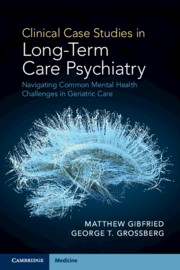 Clinical Case Studies in Long-Term Care Psychiatry
Clinical Case Studies in Long-Term Care Psychiatry Book contents
- Clinical Case Studies in Long-Term Care Psychiatry
- Clinical Case Studies in Long-Term Care Psychiatry
- Copyright page
- Contents
- Preface
- Section 1 Neurocognitive Disorders
- Case 2 “I Think I Hit My Head”
- Case 3 “It’s like She’s a Different Person”
- Case 4 “I Am Tired All the Time”
- Case 5 “I Am Okay”
- Case 6 “Leave Me Alone”
- Case 7 “I Am Fine”
- Case 8 “Those Children Are Cute”
- Case 9 “Those Terrible Men Have Left”
- Case 10 “I Saw the Heavenly Gates”
- Case 11 “Leave Me Alone”
- Section 2 Mood Disorders
- Case 13 “My Mom Looks Like a Zombie!”
- Case 14 “My Soul Is in England”
- Case 15 “I Feel Terrible”
- Case 16 “I Don’t Care”
- Case 17 “I Feel Very Lonely”
- Case 18 “I Don’t Feel Right”
- Case 19 “I Am Feeling Great”
- Case 20 “I Am Staying Here Illegally”
- Section 3 Psychotic Disorders
- Case 22 “He Just Won’t Get Up”
- Case 23 “My Body Is Being Taken over by a Fungus!”
- Case 24 “This Is Humiliating”
- Case 25 “I Want to Go Home”
- Case 26 “I Am a Worrier”
- Case 27 “Get out of My House”
- Section 4 Anxiety and Related Disorders
- Case 29 “My Vision Has Been Worsening in the Last Two Weeks”
- Case 30 “I Am Not Addicted to Valium”
- Case 31 “Of Course, I Worry about Him”
- Case 32 “Bombs Are Falling! Run, Run!”
- Section 5 Substance Abuse Disorders
- Section 6 Personality Disorders
- Case 35 “I Cannot Wait to Get out of This Miserable Place”
- Section 7 Miscellaneous Neuropsychiatric Disorders Affecting Patients in Long-Term Care
- Case 37 “Everyone Is Just So Good to Me!”
- Case 38 “Why Do They Say I Have Dementia?”
- Case 39 “I Hate That Guy … I Can’t Get Any Sleep!”
- Case 40 “Just One Kiss”
- Case 41 “I Don’t Feel Well”
- Case 42 “I Like Food”
- Case 43 “I Like the Way She Laughs”
- Case 44 “This Is So Hard”
- Index
- References
Case 10 - “I Saw the Heavenly Gates”
End-of-Life Care in MNCD
Published online by Cambridge University Press: 31 October 2024
- Clinical Case Studies in Long-Term Care Psychiatry
- Clinical Case Studies in Long-Term Care Psychiatry
- Copyright page
- Contents
- Preface
- Section 1 Neurocognitive Disorders
- Case 2 “I Think I Hit My Head”
- Case 3 “It’s like She’s a Different Person”
- Case 4 “I Am Tired All the Time”
- Case 5 “I Am Okay”
- Case 6 “Leave Me Alone”
- Case 7 “I Am Fine”
- Case 8 “Those Children Are Cute”
- Case 9 “Those Terrible Men Have Left”
- Case 10 “I Saw the Heavenly Gates”
- Case 11 “Leave Me Alone”
- Section 2 Mood Disorders
- Case 13 “My Mom Looks Like a Zombie!”
- Case 14 “My Soul Is in England”
- Case 15 “I Feel Terrible”
- Case 16 “I Don’t Care”
- Case 17 “I Feel Very Lonely”
- Case 18 “I Don’t Feel Right”
- Case 19 “I Am Feeling Great”
- Case 20 “I Am Staying Here Illegally”
- Section 3 Psychotic Disorders
- Case 22 “He Just Won’t Get Up”
- Case 23 “My Body Is Being Taken over by a Fungus!”
- Case 24 “This Is Humiliating”
- Case 25 “I Want to Go Home”
- Case 26 “I Am a Worrier”
- Case 27 “Get out of My House”
- Section 4 Anxiety and Related Disorders
- Case 29 “My Vision Has Been Worsening in the Last Two Weeks”
- Case 30 “I Am Not Addicted to Valium”
- Case 31 “Of Course, I Worry about Him”
- Case 32 “Bombs Are Falling! Run, Run!”
- Section 5 Substance Abuse Disorders
- Section 6 Personality Disorders
- Case 35 “I Cannot Wait to Get out of This Miserable Place”
- Section 7 Miscellaneous Neuropsychiatric Disorders Affecting Patients in Long-Term Care
- Case 37 “Everyone Is Just So Good to Me!”
- Case 38 “Why Do They Say I Have Dementia?”
- Case 39 “I Hate That Guy … I Can’t Get Any Sleep!”
- Case 40 “Just One Kiss”
- Case 41 “I Don’t Feel Well”
- Case 42 “I Like Food”
- Case 43 “I Like the Way She Laughs”
- Case 44 “This Is So Hard”
- Index
- References
Summary
Primary health care providers and mental health professionals are likely to be engaged with family or care staff with questions regarding end-of-life care issues in those in the terminal stages of major neurocognitive disorders. Those who provide care in the long-term care setting should be familiar with issues regarding end-of-life care in MNCD. Palliative care is an approach to medical care that focuses on providing relief from pain, other symptoms, and the physical, emotional, and psychosocial stress that individuals with serious illnesses may experience. The primary goal of palliative care is to improve the quality of life for patients and their families, particularly when dealing with complex, chronic, or terminal medical conditions. Hospice care is appropriate for patients that are entering the terminal stage of illness and is provided through a licensed hospice agency. The hospice care model focuses on improving comfort and quality of life. It is a holistic approach that encompasses physical, emotional, social, and spiritual support and can be provided in almost any care setting.
- Type
- Chapter
- Information
- Clinical Case Studies in Long-Term Care PsychiatryNavigating Common Mental Health Challenges in Geriatric Care, pp. 46 - 51Publisher: Cambridge University PressPrint publication year: 2024
